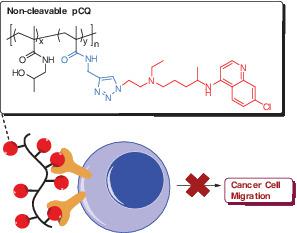当前位置:
X-MOL 学术
›
J. Polym. Sci. A Polym. Chem.
›
论文详情
Our official English website, www.x-mol.net, welcomes your
feedback! (Note: you will need to create a separate account there.)
Synthesis and biological characterization of clicked chloroquine copolymers as macromolecular inhibitors of cancer cell migration
Journal of Polymer Science Part A: Polymer Chemistry Pub Date : 2019-10-09 , DOI: 10.1002/pola.29512 Fei Yu 1 , Yazhe Wang 1 , Yu Hang 1 , Weimin Tang 1 , Zhifeng Zhao 1 , David Oupický 1
Journal of Polymer Science Part A: Polymer Chemistry Pub Date : 2019-10-09 , DOI: 10.1002/pola.29512 Fei Yu 1 , Yazhe Wang 1 , Yu Hang 1 , Weimin Tang 1 , Zhifeng Zhao 1 , David Oupický 1
Affiliation

|
We report synthesis of nondegradable chloroquine (CQ)‐containing N‐(2‐hydroxyethyl)methacrylamide (HPMA) copolymers (pCQ2) by a combination of reversible addition‐fragmentation chain‐transfer (RAFT) polymerization and click chemistry. The ability of the copolymers to inhibit cancer cell migration was compared to our previously reported degradable pCQ1 in breast cancer cells utilizing transwell and wound healing assays. Both cleavable and noncleavable pCQ demonstrated enhanced inhibitory activity when compared with small‐molecule CQ. This study validates that pCQ2 functions as a macromolecular inhibitor of cancer cell migration without the need for CQ release and provides support for pCQ as a new class of antimetastatic polymer agents with a possibly unique mechanism of action. © 2019 Wiley Periodicals, Inc. J. Polym. Sci., Part A: Polym. Chem. 2019, 57, 2235–2242
中文翻译:

作为癌细胞迁移大分子抑制剂的单击式氯喹共聚物的合成及生物学表征
我们报告了不可降解的氯喹(N)的合成-(2-羟乙基)甲基丙烯酰胺(HPMA)共聚物(pCQ2)通过可逆加成-断裂链转移(RAFT)聚合和点击化学的组合来实现。使用transwell和伤口愈合试验,将共聚物抑制癌细胞迁移的能力与我们先前报道的乳腺癌细胞中可降解的pCQ1进行了比较。与小分子CQ相比,可裂解和不可裂解pCQ均表现出增强的抑制活性。这项研究证实了pCQ2可以作为癌细胞迁移的大分子抑制剂而无需释放CQ,并为pCQ作为一种新型的抗转移性高分子药物提供了支持,具有可能独特的作用机理。分级为4 +©2019 Wiley Periodicals,Inc.J.Polym。科学,A部分:Polym。化学 2019,57,2235年至2242年
更新日期:2019-10-09
中文翻译:

作为癌细胞迁移大分子抑制剂的单击式氯喹共聚物的合成及生物学表征
我们报告了不可降解的氯喹(N)的合成-(2-羟乙基)甲基丙烯酰胺(HPMA)共聚物(pCQ2)通过可逆加成-断裂链转移(RAFT)聚合和点击化学的组合来实现。使用transwell和伤口愈合试验,将共聚物抑制癌细胞迁移的能力与我们先前报道的乳腺癌细胞中可降解的pCQ1进行了比较。与小分子CQ相比,可裂解和不可裂解pCQ均表现出增强的抑制活性。这项研究证实了pCQ2可以作为癌细胞迁移的大分子抑制剂而无需释放CQ,并为pCQ作为一种新型的抗转移性高分子药物提供了支持,具有可能独特的作用机理。分级为4 +©2019 Wiley Periodicals,Inc.J.Polym。科学,A部分:Polym。化学 2019,57,2235年至2242年











































 京公网安备 11010802027423号
京公网安备 11010802027423号